How does potato allergy manifest in children and adults?
Potatoes can rightfully be called one of the most popular products not only in Russia, but throughout the world. Due to its ubiquity, it even received the name “second bread”. This vegetable is present in the daily and holiday menus of most people, and the number of dishes that can be prepared with it is in the hundreds.
Many people cannot imagine their diet without potatoes, but some people cannot eat them due to allergies. How an allergy to potatoes can manifest itself and what measures need to be taken to avoid troubles, read on.
Can potatoes cause allergies?
When asked whether potatoes are an allergen, most people answer in the negative, but they are wrong. Even this a familiar and common product can cause an allergic reaction.
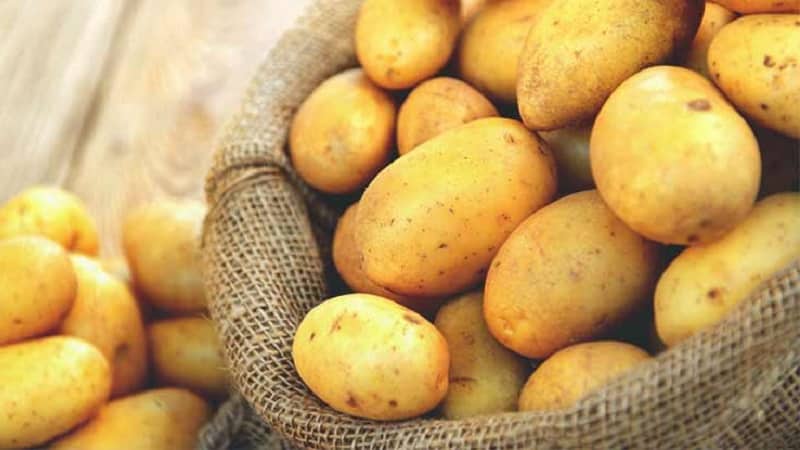
Allergy to this vegetable is a relatively rare occurrence., which very few people encounter. But it can appear spontaneously and at any age. Recently, children under 6 years of age have been at risk.
Important! Although an allergy to potatoes is rare, it can lead to severe consequences, including anaphylactic shock.
Doctors link allergies to the general deterioration of the nation's health, unhealthy lifestyle, in particular, eating junk food. In children, intolerance occurs due to lack of breastfeeding.
A hereditary component should not be ruled out.. If the parents have allergies, the child may also be susceptible to it.
Allergies to other crops:
How does an allergy to carrots manifest itself and how is it treated?
Can an allergy to rice occur and how does it manifest itself?
Why allergies occur
The causes and mechanisms of allergy to potatoes, as well as to many other products, have not yet been studied in sufficient detail. A number of substances contained in this vegetable can cause an immune system reaction..
The main allergens in potatoes are proteins.. Among them, the most active are patatin, tuberin and cathepsin D.
Of the non-protein substances, potato starch poses the greatest threat.. This carbohydrate brings much more trouble to allergy sufferers, since it is actively used in the food industry. There is a high risk of getting an allergic reaction by consuming a product that is not directly related to potatoes. Person with intolerance starch can get an allergic attack by eating berry jelly or tomato ketchup.
Allergies can be caused not only by eating potatoes. Sometimes rashes appear even when peeling this vegetable or from its smell. In this regard, young potatoes are the most dangerous for allergy sufferers. The starch content in it is higher than in old tubers, so the allergic reaction is much more severe.
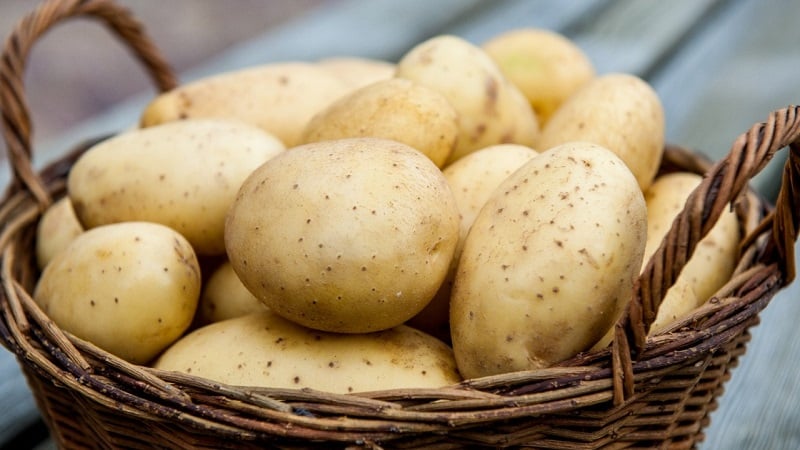
Signs and symptoms of allergies
Potato intolerance can manifest itself in different ways and can affect people of all ages. - from infants to the elderly. Symptoms vary greatly depending on the person's age.
In infants
For the first time, symptoms of potato intolerance may appear in babies at 3-3.5 months. At this age, the allergen enters the body along with mother's milk.TThe fact that a baby cannot have potatoes can be determined by the following signs::
 the child is worried and capricious;
the child is worried and capricious;- problems with sleep appear;
- decrease (and sometimes complete loss) of appetite;
- unpleasant-smelling belching;
- gas formation;
- colic;
- stool changes (color and consistency changes).
If these symptoms occur, the mother should exclude potatoes from your menu and consult a doctor.
An even greater risk of developing allergies appears if the child is bottle-fed. Some food mixtures are made using potato starch. Eating them can cause the same symptoms. If the baby develops intolerance, it is necessary to replace the mixture used with a hypoallergenic one.
Important! When choosing hypoallergenic formulas for feeding an allergic child, preference should be given to those containing goat's milk.
The period from 4 months to a year when complementary foods are introduced is dangerous.. Many manufacturers' baby food, especially curds and various purees, add potato starch as a thickener.
If the potato allergy began in a child over 4 months of age, you need to remove this product from complementary foods. There is a possibility that the reaction is not caused by an immune response to the allergen, but by a disorder of the digestive system. In such cases, you need to wait up to 11–12 months.
In children
A negative reaction to potatoes in children older than one year is expressed as follows::
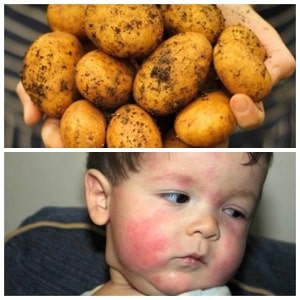 poor appetite;
poor appetite;- stomach ache;
- attacks of nausea and vomiting;
- diarrhea;
- itching;
- redness and peeling of the skin (especially on the cheeks), rashes and blisters;
- nasal congestion.
If a small child has an intolerance to potatoes, you should consult a specialist.. The good news is that many children get rid of allergies after 6 years and can safely consume this vegetable.
In adults
Allergy symptoms in adults:
- skin rashes - redness, blisters, blisters;
- severe itching, especially in areas of rashes, may be accompanied by dryness and flaking of the skin;
- runny nose, swelling of the mucous membranes, sneezing;
- attacks of nausea, vomiting, stomach pain, colic, flatulence, diarrhea (sometimes with traces of mucus and blood);
- decreased or complete loss of appetite.
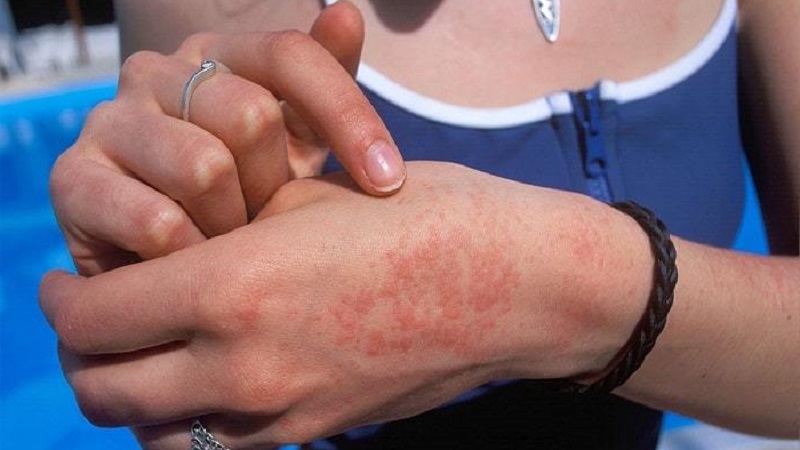
The most common reaction in adults is skin rashes and itching.. They appear already in the first minutes after eating potatoes. Other symptoms may appear after a few hours.
Important! The reaction to different types of potatoes can vary greatly. The greatest risk of allergy occurs when consuming young potatoes and tubers that have been heavily treated with pesticides.
Types of allergic reaction
Potato intolerance can manifest itself in different ways.
Depending on the symptoms, doctors distinguish 4 types of reactions:
- Dermatological. It is characterized by itching (as a rule, it appears in the mouth), the appearance of a rash, and the development of atopic dermatitis. In mild allergies, ulcers with white liquid inside or red spots appear only around the lips, in severe cases they cover the entire body.
- Food. She is characterized by stomach pain, nausea, vomiting and diarrhea. This type of allergy is often confused with food poisoning.
- Respiratory. In this case, a person suffers from a cough and runny nose, which occurs due to inflammation of the mucous membranes, and shortness of breath appears.
- System. This is the rarest and most severe reaction. It can cause hypotension (a severe decrease in blood pressure), Quincke's edema (local, rapidly spreading swelling that most often affects the throat or lower part of the face) or anaphylactic shock. These phenomena are deadly and require immediate hospitalization.
Diagnosis of allergies
If you suspect you have a potato allergy, you should immediately remove it from the menu for 4-5 weeks. Then you need to eat some potatoes again to see if allergy symptoms appear. Skin rashes usually occur within 5-10 minutes after consumption.
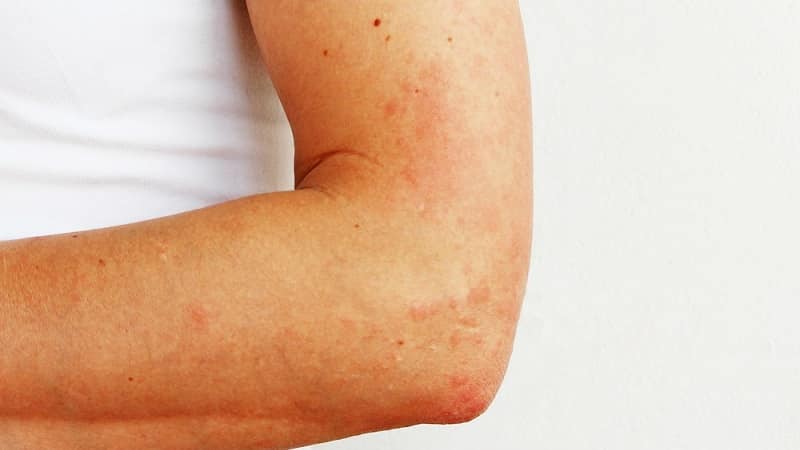
Sometimes potato intolerance is seasonalwhen respiratory allergens (plant pollen) cross-react with food allergens and provoke an immune response. People with allergies to birch pollen need to be especially careful during the flowering period of this plant. Birch pollen can cross-react with potatoes.
An allergy may occur not to the tubers themselves, but to the spices that were used in cooking product. Sometimes a food reaction becomes a sign not of an allergy, but of solanine or pesticide poisoning. Therefore, only a doctor can recognize the allergen and prescribe effective treatment.
Based on the results of the initial examination of the patient, the allergist gives a referral for tests to determine the allergen. There are several types of diagnostics:
- blood test for the content of eosinophils - allergic cells;
- skin tests;
- blood test for immunoglobulins;
- studying the patient's immune status.
A course of treatment is prescribed only after receiving test results. You cannot self-medicate - it can only worsen the situation.

Treatment of potato allergy
Treatment can be divided into three blocks: diet, symptom management and drug therapy.
First of all, avoid contact with the allergen.. To do this, the doctor prescribes a special diet without potatoes and foods containing starch.
Histamine H1 receptor blockers are used to relieve symptoms (“Fenistil-gel”), cromones (“Intal” or “Cromoglicic acid”) and topical glucocorticosteroids (“Beclomethasone”).
If there is a risk of developing Quincke's edema, it is necessary have Prednisolone on hand to give the injection in a timely manner.
Important! You cannot treat children and adults with the same drugs. Many antihistamines are contraindicated in young children because the active ingredient in them can cause serious side effects.
Infants aged from 1 month if allergies develop, give Suprastin and Fenistil (in the form of drops).
Children over 1 year old are allowed "Tavegil" and "Erius" (in the form of syrup), as well as "Zodak" (in the form of drops). After 6 years, it is permissible to use Tavegila, Zirteca and Fexadin tablets.

For adults, the range of antihistamines is much wider. In the absence of contraindications, take drugs of the first (active substances - clemastine, chloropyramine, etc.), second (active substance - loratadine) or third generation (active substances - cetirizine, fexofenadine, desloratadine).
Allergen-specific immunotherapy is used to treat the cause of allergies, rather than their manifestations.. Its goal is to normalize the functioning of the immune system and block the release of immunoglobulins. To do this, small doses of the allergen are injected into the patient's body.This treatment takes a long time (the course lasts 3-7 years) and requires discipline and patience from the patient. Only this method promotes complete recovery from allergies.
Interesting things about potatoes:
Allergy prevention
People with potato intolerance follow rules that prevent allergy attacks:
- Before consuming new products, study their composition in detail. Many products contain potato starch, which can cause a reaction. Such products should be avoided.
- Do not purchase boiled sausage by weight, baked goods or other confectionery products without original packaging. In this case, there is a risk of purchasing a product with added starch.
- In cafes and restaurants, inform waiters about an allergy to potatoes. It happens that the menu does not indicate the composition of dishes, and potatoes are not always included in the list of ingredients.
- When visiting, inform the hosts about your allergies. It is better to do this in advance so that you can adjust the menu.
- If you have a severe allergy, avoid peeling potatoes, especially young ones. If you have to do this, use rubber gloves, and in the case of the respiratory type, use a mask.
- Always have antihistamines and corticosteroid ointments on hand to treat skin rashes. Take all medications on trips, even short-term ones.
- If a child suffers from allergies, warn about this the adults with whom he spends a lot of time - grandparents, nannies, educators, teachers.
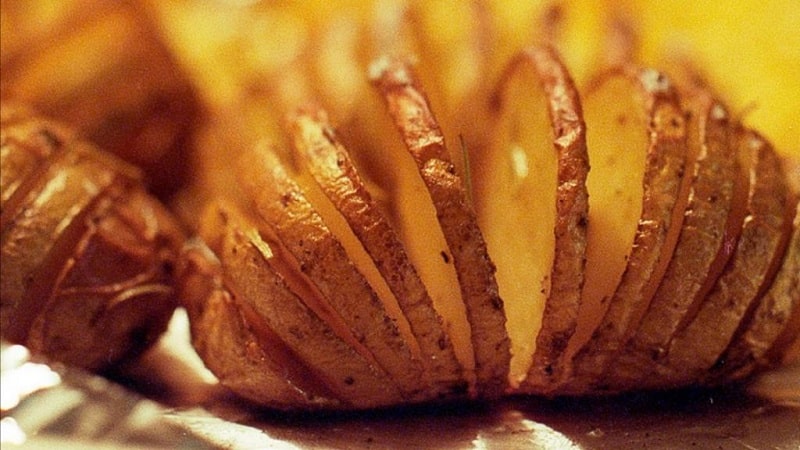
Doctors' opinion
Doctors note the difficulty of differentiating potato allergies from other diseases.
A. Adaleva, allergist: “If you yourself observe an allergic reaction to potatoes (regardless of the diagnostic results), the product must be excluded from the diet. How long you have to follow the diet is a difficult question. If you have a common intolerance, it may go away over time. But if we are talking about a true allergy, then, as a rule, it persists throughout life.”.
M. Shcheglova, allergist-immunologist: “People often confuse the symptoms of allergies and other diseases. With respiratory allergies, the patient may feel like he has a cold; cases of skin manifestations are also rarely associated with allergies. A person comes to the clinic and is prescribed the wrong treatment. But the primary care doctor is obliged to suspect such things. Before seeing an allergist, a person undergoes many months, and sometimes many years, of useless treatment. To distinguish allergies from other diseases, it is necessary to carry out a narrow diagnosis.”.
Conclusion
Potatoes have become a part of the daily diet of a huge number of people, and many cannot imagine their dinner table without this vegetable. But not everyone can use it.
Those who suffer from potato intolerance need to carefully select the menu, follow preventive measures or follow the course of treatment prescribed by the doctor.